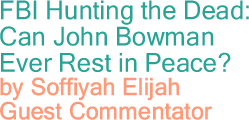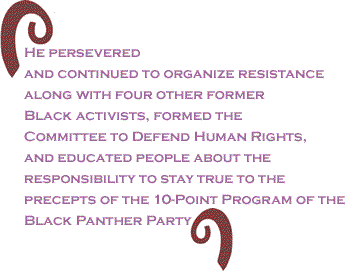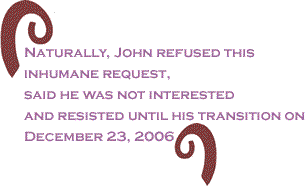
|
|||||||||||||||||||||
 |
|||||||||||||||||||||
 |
|
|
John Bowman is a former Panther who was arrested in New Orleans in 1973 and was tortured by a task force of law enforcement officers from several jurisdictions. In 2003, some of those same agents came to his home in Oklahoma City and confronted him about an unsolved 1971 police murder in San Francisco. So began a several year journey of resisting interrogations and Grand Jury subpoenas. Shortly after getting out of San Francisco County Jail in October of 2005 for refusing to cooperate in a modern-day COINTELPRO investigation, John was diagnosed with terminal cancer. He persevered and continued to organize resistance along with four other former Black activists, formed the Committee to Defend Human Rights, and educated people about the responsibility to stay true to the precepts of the 10-Point Program of the Black Panther Party. Despite the pain of his illness and the ongoing suffering caused by his 33-year post-traumatic, post-torture pains, John Bowman educated and gave his soul to his people, community and the struggle. Just weeks before his death, the same California Attorney General’s office that tried to force him to cooperate with his tormentors and jailed him for contempt of the Grand Jury, and who knew he was in terminal pain, called his attorney, Douglas Parr, in Oklahoma City to ask if he might have had a change of heart and now wanted to cooperate. Naturally, John refused this inhumane request, said he was not interested and resisted until his transition on December 23, 2006.
But the torment doesn’t end at his passing. On Tuesday, February 13, 2007, two local FBI agents, one who identified himself as John Coyle, visited a funeral home in Oklahoma City and interrogated the owner and two staff people regarding the services it provided for John Bowman's cremation and memorial. They displayed their badges and one left his card. It was clear from the tone and nature of their questions that they suspected that John had not actually died, and perhaps one or more people had participated in a scheme to feign his death. According to the agents, they were investigating John as a fugitive. They wanted to know about all the events leading up to his memorial service. The agents asked for the name of the crematorium, the doctor, the medical examiner, where John died, who picked up the body and who handled the service. They also questioned how the owner could be certain that it was indeed John's body that had been cremated. The agents wanted to know if they had seen the body and if they could verify from a photo that it had been John who died. They were told that the body had not been viewed at that funeral home by anyone because it had already been cremated. Near the end of their visit the agents asked one of the funeral home administrators for their full name, date of birth, home address, home phone number, social security number and any other numbers where they could be reached. When asked why they needed all the personal information, the agents responded that it would be entered into the FBI data base. The funeral home owner said that in all the years they have been in business, this was the first time that anything like this had ever happened. They couldn't believe that a question was being raised as to the identity of the deceased. Today, Ann Moorman, John Bowman’s attorney, confirmed that the Federal Bureau of Investigation has been actively questioning whether her client is in fact dead. “It was clear from the tone and nature of their questions that the agents suspected that John Bowman had in fact not died and that the Funeral Home had participated in a scheme to feign his death," said Moorman. She added, “Setting aside the insult to the Bowman family and John’s numerous friends by this inquiry, I am astonished law enforcement is questioning his death. John Bowman spent months in a local hospital suffering from cancer. Before his illness he demonstrated his willingness to face these baseless allegations by appearing numerous times during the course of various grand jury proceedings. The authorities know that if John Bowman were alive today he would stand up to these allegations and vigorously defend himself and the other men also facing the charges.” After their interrogation at the funeral home, the agents went to the crematorium to interrogate the owner of that business. Again they asked if the owner had seen the body and if he could identify a photo. The owner explained that the body arrived wrapped in a sheet and that he hadn't seen it. The agents had photos they wanted him to view but he insisted that he had not seen the body and therefore would be unable to identify any photos. They requested to see the log records for the body. They went on to ask the owner if he knew John personally, if he had heard of John, how it was that he was asked to do the cremation and what had been done with the ashes!! At the close of their interrogation they asked the owner for the same personal information they had asked for from the funeral home administrator. When he asked why they needed it, they responded that they needed it for their records. The crematorium owner said that in his 24 years of operation, this was the first time that anything like this had ever happened to him.
Moorman emphasized, “John Bowman was a proud man and would not hide from the FBI. Instead of questioning his death, they should, instead, be investigating why many court records favorable to the defense are missing. Or why various items of physical evidence have also turned up missing. They overlook those obvious suspicious developments that bear directly on the credibility of this prosecution and instead go looking for a dead man. The whole case just does not pass the smell test and this just further confirms it.” Can John Bowman ever rest in peace? J. Soffiyah Elijah serves as Deputy Director of the Criminal Justice Institute (CJI) at Harvard Law School (HLS). In her capacity as Deputy Director at CJI, she is both an administrator and a clinical instructor. |
|
| Home | |
| March
22, 2007 Issue 222 |
||||||||||||||
|
||||||||||||||
| Printer Friendly Version in resizeable plain text format | ||||||||||||||
 |
||||||||||||||
|
||||||||||||||
 |
||||||||||||||
 |
||||||||||||||
 |
||||||||||||||
| |
||||||||||||||
| |
||||||||||||||































